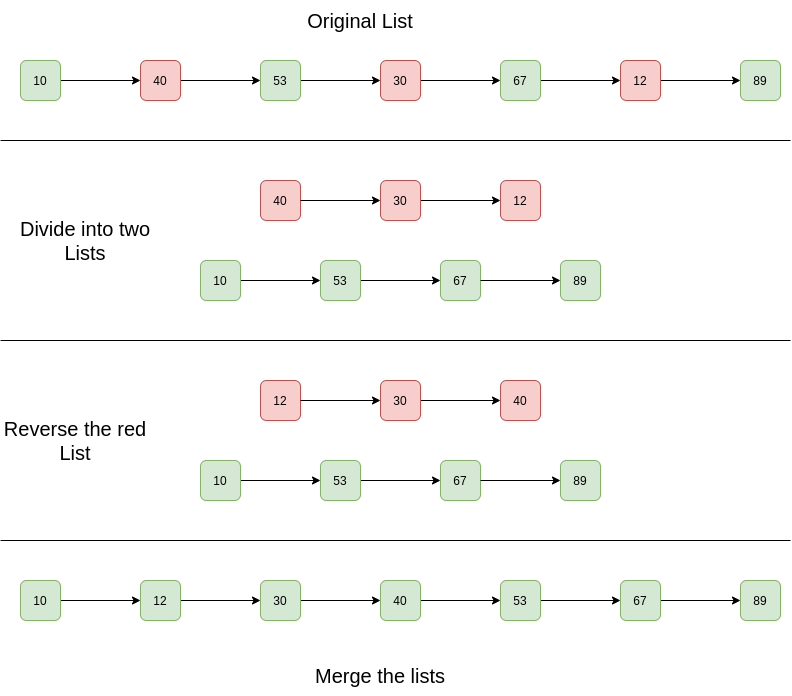用于对按升序和降序交替排序的链表进行排序的Python程序
给定一个链表。链接列表按升序和降序交替排列。有效地对列表进行排序。
例子:
Input List: 10 -> 40 -> 53 -> 30 -> 67 -> 12 -> 89 -> NULL
Output List: 10 -> 12 -> 30 -> 40 -> 53 -> 67 -> 89 -> NULL
Input List: 1 -> 4 -> 3 -> 2 -> 5 -> NULL
Output List: 1 -> 2 -> 3 -> 4 -> 5 -> NULL简单的解决方案:
方法:基本思想是在链表上应用归并排序。
本文讨论了实现:链表的合并排序。
复杂性分析:
- 时间复杂度:链表的归并排序需要 O(n log n) 时间。在归并排序树中,高度为 log n。对每个级别进行排序将花费 O(n) 时间。所以时间复杂度是O(n log n)。
- 辅助空间: O(n log n),在归并排序树中,高度为 log n。存储每个级别将占用 O(n) 空间。所以空间复杂度是O(n log n)。
高效解决方案:
方法:
- 分开两个列表。
- 按降序反转一个
- 合并两个列表。
图表:

下面是上述算法的实现:
Python
# Python program to sort a linked list
# that is alternatively sorted in
# increasing and decreasing order
class LinkedList(object):
def __init__(self):
self.head = None
# Linked list Node
class Node(object):
def __init__(self, d):
self.data = d
self.next = None
def newNode(self, key):
return self.Node(key)
# This is the main function that sorts
# the linked list.
def sort(self):
# Create two dummy nodes and
# initialize as
# heads of linked lists
Ahead = self.Node(0)
Dhead = self.Node(0)
# Split the list into lists
self.splitList(Ahead, Dhead)
Ahead = Ahead.next
Dhead = Dhead.next
# Reverse the descending list
Dhead = self.reverseList(Dhead)
# Merge the 2 linked lists
self.head = self.mergeList(Ahead,
Dhead)
# Function to reverse the linked list
def reverseList(self, Dhead):
current = Dhead
prev = None
while current != None:
self._next = current.next
current.next = prev
prev = current
current = self._next
Dhead = prev
return Dhead
# Function to print linked list
def printList(self):
temp = self.head
while temp != None:
print temp.data,
temp = temp.next
print ''
# A utility function to merge two
# sorted linked lists
def mergeList(self, head1, head2):
# Base cases
if head1 == None:
return head2
if head2 == None:
return head1
temp = None
if head1.data < head2.data:
temp = head1
head1.next = self.mergeList(head1.next,
head2)
else:
temp = head2
head2.next = self.mergeList(head1,
head2.next)
return temp
# This function alternatively splits a
# linked list with head as head into two:
# For example, 10->20->30->15->40->7 is
# splitted into 10->30->40 and 20->15->7
# "Ahead" is reference to head of ascending
# linked list
# "Dhead" is reference to head of descending
# linked list
def splitList(self, Ahead, Dhead):
ascn = Ahead
dscn = Dhead
curr = self.head
# Link alternate nodes
while curr != None:
# Link alternate nodes in ascending
# order
ascn.next = curr
ascn = ascn.next
curr = curr.next
if curr != None:
dscn.next = curr
dscn = dscn.next
curr = curr.next
ascn.next = None
dscn.next = None
# Driver code
llist = LinkedList()
llist.head = llist.newNode(10)
llist.head.next = llist.newNode(40)
llist.head.next.next =
llist.newNode(53)
llist.head.next.next.next =
llist.newNode(30)
llist.head.next.next.next.next =
llist.newNode(67)
llist.head.next.next.next.next.next =
llist.newNode(12)
llist.head.next.next.next.next.next.next =
llist.newNode(89)
print 'Given linked list'
llist.printList()
llist.sort()
print 'Sorted linked list'
llist.printList()
# This code is contributed by BHAVYA JAIN输出:
Given Linked List is
10 40 53 30 67 12 89
Sorted Linked List is
10 12 30 40 53 67 89复杂性分析:
- 时间复杂度: O(n)。
需要一次遍历来分离列表并将它们反转。排序列表的合并需要 O(n) 时间。 - 辅助空间: O(1)。
不需要额外的空间。
请参阅完整文章对按升序和降序交替排序的链表进行排序?更多细节!